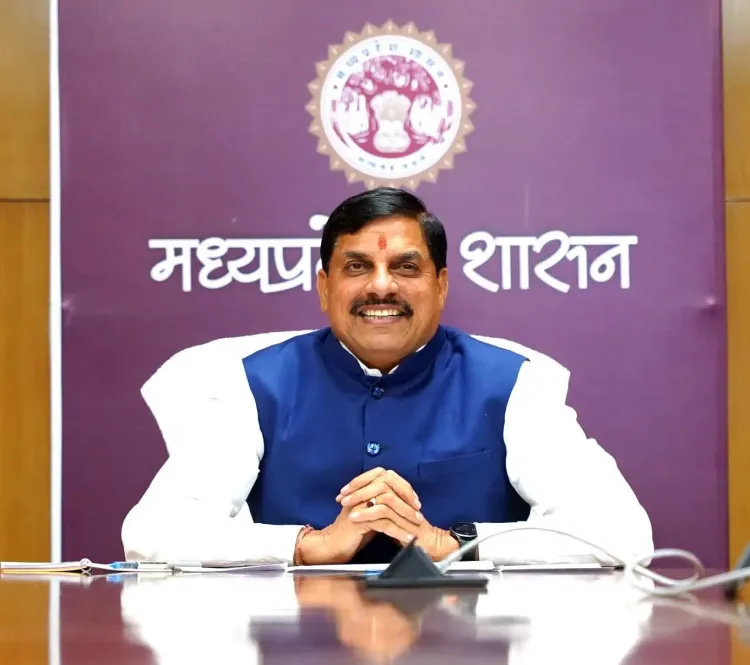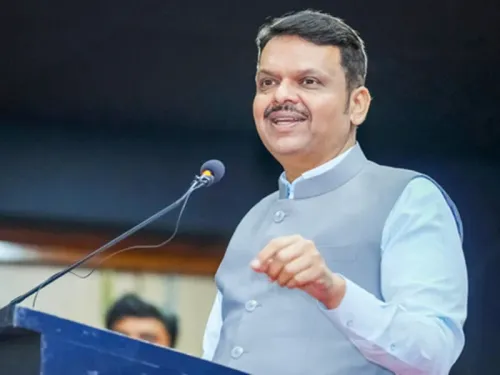Madhya Pradesh Targets Rs 22.5 Lakh Per Capita Income by 2047: Chief Minister Mohan Yadav

Synopsis
Key Takeaways
- Madhya Pradesh's per capita income projected at Rs 22,50,000 by 2047.
- Significant 31 percent increase in infrastructure spending for 2025-26.
- Agricultural and forestry sectors have doubled in size.
- Investment in solar energy for farmers through the PM Krishak Mitra Surya Yojana.
- Rs 850 crore allocated for farmer-oriented initiatives.
Bhopal, March 24 (NationPress) In the fiscal year 2002-03, Madhya Pradesh's per capita income was a modest Rs 11,000. Currently, the state budget reveals an impressive increase to Rs 1,52,000 per capita income. Looking toward the future, Madhya Pradesh is targeting a budget of Rs 250 lakh crore by 2047, which aims for a projected per capita income of Rs 22,50,000.
Chief Minister Dr. Mohan Yadav articulated this ambitious vision during the budget session of the State Assembly on Monday, prior to the session's adjournment sine die.
This forward-thinking strategy emphasizes enhancing capital investment, improving infrastructure including roads and electricity, elevating healthcare standards, and generating job opportunities for marginalized and middle-class communities.
For the fiscal year 2025-26, infrastructure investment is expected to experience a historic 31 percent increase, with 17 percent of the overall budget allocated to this sector.
Highlighting the economic progress of the state, CM Yadav pointed out that the gross domestic product is projected at Rs 16.94 lakh crore, making Madhya Pradesh the second fastest-growing state in the country.
In the last six years, the sectors of agriculture and forestry have doubled in size, emphasizing the importance of this budget.
The Policy Commission and the Reserve Bank of India (RBI) have acknowledged the state's fiscal health and expenditure quality, positioning it as a national leader.
Culturally, the teachings of the Gita are inspiring efforts to rejuvenate traditions. Plans are in motion to restore Geeta Bhawan, with Rs 100 crore designated for this initiative.
Milk production, currently at 9 percent, is projected to rise to 20 percent through initiatives like the Vrindavan scheme, which is backed by an allocation of Rs 100 crore.
Other funding includes Rs 25 crore for the Avaral Namda Basin and Rs 100 crore dedicated to developing pilgrimage sites.
Farmers are at the heart of the state's agenda, with Rs 850 crore allocated for farmer-centric programs. Investments also include Rs 100 crore for hostels for working women and Rs 80 crore for transportation facilities.
Road development in tribal areas aims to tackle long-standing challenges.
The PM Krishak Mitra Surya Yojana is a transformative initiative intended to provide electricity access to 32 lakh farmers through solar pumps within the next three years.
A significant Rs 442 crore has been budgeted for this program.
Additional support for agricultural growth includes crop yield bonuses and other measures.
Moreover, over Rs 2,000 crore has been allocated for public services, including plans for the grand celebration of the Simhastha Kumbh in 2028, aimed at improving services for devotees.
Additionally, Rs 500 crore has been set aside to honor the contributions of Lord Shankaracharya to the nation and Sanatan Dhama, ensuring his legacy is preserved for future generations.
During the 56 hours of the session, members deliberated for 16 hours and 30 minutes on the budget.
Throughout the nine sittings of the fifth session of the 16th Assembly, 2,939 questions were posed, with 1,448 listed for discussion.
Of the 624 call-attention motion notices, 33 were accepted.
One significant private resolution was also passed by the Assembly. Additionally, the house approved a second adjunct budget for the year 2024-25.









